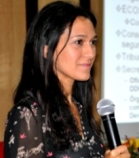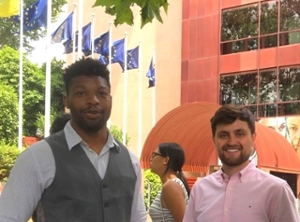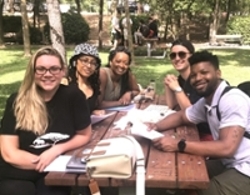Academics
Students take two courses and five semester hours of credit. Students choose between two available three-credit courses which meet from 9am until 11:30am. All students take the two-credit course which meets from 11:45am until 1:15pm.
Course Schedule
Class Dates for 2026
Optional meetup and informal orientation: Monday, May 25
First class day and orientation: Tuesday, May 26
Last class day: Wednesday, June 25
Reading day: Friday, June 26
Final exams: Saturday, June 27
Course Descriptions
Overview of European Union Law
Professors: Bruno Aguilera Barchet, María Pilar Trinidad, Angelines Cano Linares, Yolanda Dutrey Guantes, and othersy
Course DescriptionThe goal of this course is to give students a general introduction to European Union law. The course starts with the history of European integration, giving students the opportunity to compare U.S. history and the history of the EU. The course then tackles EU values such as human rights, freedom, and democracy. Next, business aspects of the EU are considered from a practical point of view. Finally, the course will cover international dispute resolution issues in the context of the EU. For example, students will learn which European country's courts have jurisdiction to hear a case, what law that court will apply, what remedies the court may award, and how a judgment given in one country may be enforced in another. The course will include a site visit to a Spanish law firm as well as to the European Association of Arbitration.
Credit hours: 2
Textbook: TBD
International Business Transactions
Professor: Professor: Stewart Paley
Course Description: International Business Transactions teaches how to do business across country borders, whether that business be buy/sell arrangements, franchises and subsidiaries, or foreign direct investment. IBT is also about culture, people, and differing law and custom, and that is where it really gets fun. We will learn how to do business internationally (which will reinforce how to do business deals here in the U.S.), what to watch out for, and how to help your client succeed in the international arena. We will look at cases, hypotheticals, and background stories. This book may even change the way you think about the world and your everyday shopping habits. No business experience or prerequisite courses needed.
Credit hours: 3
Textbook: Daniel K. Chow and Thomas J. Schoenbaum, International Business Transactions (Aspen Casebook), 5th edition, 2023)
International and Comparative Law of Economic and Climate Migration
Professor: Serge Martinez
Course Description: This course will address legal issues that affect economic and climate migrants while in transit and after reaching their destination countries. We will look at the domestic laws and policies of several countries to compare the ways that economic and climate migrants are protected (or unprotected) by domestic law, particularly labor and employment law. We will also explore international law and policy regarding the rights of migrants and the obligations of states. In addition, we will identify and analyze the forces that affect the development and enforcement of migrants’ rights and assess proposals for reform.
Credit Hours: 3
Textbook: International Migration Law, Vincent Chetail (Oxford Press 2019)
Bruno Aguilera Barchet
 Prof. (Catetrático), U. Rey Juan Carlos, Facultad de Ciencias Jurídicas y Sociales. Undergraduate law degree with Premio Extraordinario and Ph.D, U. Complutense de Madrid. Current Director of the Instituto de Estudios Jurídicos Internacionales (Institute of International Legal Studies) at U. Rey Juan Carlos. Visiting Researcher, Harvard University. Former Vice-President of U. Rey Juan Carlos and former Dean of its Facultad de Ciencias Jurídicas y Sociales. Visiting Professor at the Center of European Legal History at the U. de Paris (Paris XII). Member of the Academic Council of the Center For European Studies, the official think tank of the European People's Party funded by the European Parliament.
Prof. (Catetrático), U. Rey Juan Carlos, Facultad de Ciencias Jurídicas y Sociales. Undergraduate law degree with Premio Extraordinario and Ph.D, U. Complutense de Madrid. Current Director of the Instituto de Estudios Jurídicos Internacionales (Institute of International Legal Studies) at U. Rey Juan Carlos. Visiting Researcher, Harvard University. Former Vice-President of U. Rey Juan Carlos and former Dean of its Facultad de Ciencias Jurídicas y Sociales. Visiting Professor at the Center of European Legal History at the U. de Paris (Paris XII). Member of the Academic Council of the Center For European Studies, the official think tank of the European People's Party funded by the European Parliament.
Yolanda Dutrey Guantes
 Prof. (with Tenure), U. Rey Juan Carlos, Facultad de Ciencias Jurídicas y Sociales. Undergraduate law degree and Ph.D (focus on private international law); Masters in European Community Law and Masters in Law Practice. Teaches courses on private international law and commercial law. Research interests include international contract law, international civil procedure, and international family law. Past coordinator of Erasmus and Seneca International Relations programs at the Facultad de Ciencias Jurídicas y Sociales at U. Rey Juan Carlos. Permanent collaborator with the Madrid Bar Association, teaching international law courses.
Prof. (with Tenure), U. Rey Juan Carlos, Facultad de Ciencias Jurídicas y Sociales. Undergraduate law degree and Ph.D (focus on private international law); Masters in European Community Law and Masters in Law Practice. Teaches courses on private international law and commercial law. Research interests include international contract law, international civil procedure, and international family law. Past coordinator of Erasmus and Seneca International Relations programs at the Facultad de Ciencias Jurídicas y Sociales at U. Rey Juan Carlos. Permanent collaborator with the Madrid Bar Association, teaching international law courses.
Angelines Cano Linares
 Prof., U. Rey Juan Carlos, Facultad de Ciencias Jurídicas y Sociales. Undergraduate law degree and Ph.D (public international law), U. Rey Juan Carlos. Teaches courses on public international law, international relations, and European Union law. Director of the Ibero-American International Relations masters degree program at U. Rey Juan Carlos. Deputy Director of the Centro de Estudios de Iberoamerica (Ibero-American Studies Center) at U. Rey Juan Carlos. Research interests include the UN Security Council, international investments, international migration, economic integration organizations, and Latin American legal systems.
Prof., U. Rey Juan Carlos, Facultad de Ciencias Jurídicas y Sociales. Undergraduate law degree and Ph.D (public international law), U. Rey Juan Carlos. Teaches courses on public international law, international relations, and European Union law. Director of the Ibero-American International Relations masters degree program at U. Rey Juan Carlos. Deputy Director of the Centro de Estudios de Iberoamerica (Ibero-American Studies Center) at U. Rey Juan Carlos. Research interests include the UN Security Council, international investments, international migration, economic integration organizations, and Latin American legal systems.
María Pilar Trinidad
 Prof., U. Rey Juan Carlos; Undergraduate law degree and Ph.D, University of Extremadura (first in class); post-graduate studies in human rights at the Instituto Bartolomé de las Casas at the U. Carlos III of Spain; Academic Secretary at the Ibero-American Studies Institute at U. Rey Juan Carlos. Former Legal Adviser in the International Law Department at the Ministry of Foreign Affairs and Cooperation of Spain. Former Professor at the U. de Extremadura. Research interests include public international law, human rights law, international organizations, the law of international treaties, and Latin American studies.
Prof., U. Rey Juan Carlos; Undergraduate law degree and Ph.D, University of Extremadura (first in class); post-graduate studies in human rights at the Instituto Bartolomé de las Casas at the U. Carlos III of Spain; Academic Secretary at the Ibero-American Studies Institute at U. Rey Juan Carlos. Former Legal Adviser in the International Law Department at the Ministry of Foreign Affairs and Cooperation of Spain. Former Professor at the U. de Extremadura. Research interests include public international law, human rights law, international organizations, the law of international treaties, and Latin American studies.
Professor Serge Martinez
 Professor Serge Martinez teaches primarily in the UNM School of Law’s Economic Justice Clinic, which focuses on support for grassroots economic development initiatives, enforcing the rights of low-wage workers, and improving housing stability and conditions for low-income tenants. He has served as Associate Dean for Experiential Learning since 2019.
Professor Serge Martinez teaches primarily in the UNM School of Law’s Economic Justice Clinic, which focuses on support for grassroots economic development initiatives, enforcing the rights of low-wage workers, and improving housing stability and conditions for low-income tenants. He has served as Associate Dean for Experiential Learning since 2019.
Professor Serge Martinez teaches primarily in the UNM School of Law’s Economic Justice Clinic, which focuses on support for grassroots economic development initiatives, enforcing the rights of low-wage workers, and improving housing stability and conditions for low-income tenants. He has served as Associate Dean for Experiential Learning since 2019.
Previously, Professor Martinez was a Clinical Professor of Law and the founding director of the Community and Economic Development Clinic at the Maurice A. Deane School of Law at Hofstra University. Professor Martinez also founded a law clinic at National Taiwan University College of Law in Taipei, where he was a Fulbright Scholar and Visiting Professor of Law.
His background includes work as a senior staff attorney at the Urban Justice Center's Community Development Project, where he represented tenants and tenant associations and provided transactional legal assistance to non-profits and worker-owned cooperatives. He taught in the Madrid Summer Law Institute in 2018 and 2024.
Professor Stewart Paley
 Adjunct Professor of Law, University of New Mexico School of Law; J.D., Temple University. Professor Paley is an accomplished business and commercial law attorney, with over ten years of experience in private practice. He was a law firm partner at Klehr, Harrison, Harvey, Branzburg and Ellers, where he specialized in commercial lending and debtor-creditor law. He is a member of the Massachusetts, New Hampshire, New Mexico, and Pennsylvania bars. At UNM he has taught business associations, secured transactions, and international business transactions. He combines traditional law school learning methods with role plays, negotiations, contract drafting, and other real-world 23 experiences to help students learn both the theory and the nuts and bolts needed to become skilled attorneys. Professor Paley co-taught a course in the 2014 Madrid Summer Law Institute, and both co-directed and co-taught in the 2016 and 2023 Institute.
Adjunct Professor of Law, University of New Mexico School of Law; J.D., Temple University. Professor Paley is an accomplished business and commercial law attorney, with over ten years of experience in private practice. He was a law firm partner at Klehr, Harrison, Harvey, Branzburg and Ellers, where he specialized in commercial lending and debtor-creditor law. He is a member of the Massachusetts, New Hampshire, New Mexico, and Pennsylvania bars. At UNM he has taught business associations, secured transactions, and international business transactions. He combines traditional law school learning methods with role plays, negotiations, contract drafting, and other real-world 23 experiences to help students learn both the theory and the nuts and bolts needed to become skilled attorneys. Professor Paley co-taught a course in the 2014 Madrid Summer Law Institute, and both co-directed and co-taught in the 2016 and 2023 Institute.
Onsite Program Administrator
Inés García Saillard
 Degree in Anthropology, University of Barcelona; Degree in Hispanic Linguistics, University of Distance Education. Currently studying English Linguistics. Responsible for all administrative duties of the Instituto de Estudios Jurídicos Internacionales (Institute of International Legal Studies) at U. Rey Juan Carlos. Personal assistant to Prof. Bruno Aguilera, Director of the Institute of International Legal Studies. Fluent in English, Spanish, French, Catalan, and German.
Degree in Anthropology, University of Barcelona; Degree in Hispanic Linguistics, University of Distance Education. Currently studying English Linguistics. Responsible for all administrative duties of the Instituto de Estudios Jurídicos Internacionales (Institute of International Legal Studies) at U. Rey Juan Carlos. Personal assistant to Prof. Bruno Aguilera, Director of the Institute of International Legal Studies. Fluent in English, Spanish, French, Catalan, and German.
Field Trips

There will be at least two field trips during the Madrid Summer Law Institute. Tentatively, one of these visits will be to the Madrid Bar Association and the other to the Madrid Office of the European Parliament. Dates and times of these visits will not be finalized until after arrival in Madrid.
You will be expected to dress professionally for visits to legal institutions so please bring at least one outfit that is appropriate for these events.
Academic Policies
Class Attendance
The criteria for accreditation formulated by both the American Bar Association and the Association of American Law Schools require that students regularly attend classes. The policy of the UNM Law School and the Madrid Summer Law Institute requires punctual attendance in at least 80% of all classes. Individual faculty may establish a stricter attendance policy. Faculty members will take attendance on a daily basis.
The policies of the Institute require that students attend orientation, regularly attend classes, and depart only when exams are concluded. Late arrival or early departure may result in disenrollment, a failing grade, or combination of both.
Classroom Conduct
The instructor is responsible for all classroom conduct, behavior and discipline. Any action that would disrupt or obstruct an academic activity is prohibited.
Students are expected to be prepared for all classes.
Use of Institute classrooms or other facilities during scheduled activities is limited to enrolled students and university personnel. Use of these facilities during nonscheduled periods should be arranged with the Director of the Madrid Summer Law Institute.
Smoking, eating and drinking are prohibited in all classrooms and teaching laboratories.
Digital Audio/Video Recording of Classes
A student may record a class solely at the discretion of the professor. A student should obtain permission in advance from the professor
Dishonesty in Academic Matters
Each student is expected to maintain the highest standards of honesty and integrity in academic and professional matters. The University of New Mexico, the UNM School of Law and the Institute reserve the right to take disciplinary action, up to and including dismissal, against any student who is found guilty of academic dishonesty or otherwise fails to meet these standards.
Academic dishonesty includes, but is not limited to, dishonesty in quizzes, tests or assignments; claiming credit for work not done or done by others; and nondisclosure or misrepresentation in filling out applications or other university records.
Students at the Madrid Summer Law Institute are governed by the Student Code of Conduct.
Anonymous Exam Grading
The Madrid Summer Law Institute uses an anonymous grading system. During the program, each student gets a unique number which is used in lieu of the student's name on each exam. The Student Code of Conduct governs all aspects of this process.
Exams are administered by the support personnel of the Madrid Summer Law Institute who give out exam numbers and blue books to students.
Late Examinations
Examinations may not be taken early. No examination may be taken before the time and date specified on the examination schedule.
The Director may permit a student to take the exam late for good cause, such as illness at the time of the exam. In such a case, the exam must be taken as soon as the student is well enough to take it and no later than two weeks after the regularly scheduled time. Students who need to request a late examination should maintain their anonymity with the professor; see the Handbook for more information.
If a student takes an examination late, he or she will receive the grade of credit, C-, D+, D, D-, or F. No other letter grades will be given for a late examination.
A student who fails to schedule and take a makeup examination in an emergency situation shall be given an "F" for that course.
Retention of Examinations and Student Access
The University of New Mexico School of Law will retain all student examination materials for a period of one year. Students are encouraged to review their own exams and discuss them with their professors if they have any questions.
For more information regarding grading policies, see Grading Policies.
Grading
The grades awarded in the courses are indicative of the quality of work done: A=Excellent, B=Good, C=Satisfactory, D=Barely Passed, F=Failed. Teachers may give pluses and minuses in awarding the final grades. The final grade for each student is determined by the teacher teaching the course. The grades for each course are reported to the home law school of the student. Schools have different policies with respect to whether the assigned grades affect GPA, class rank, honors, awards, etc. The student should check with his or home school regarding how it will handle grades reported by the Institute.
Applicants for whom credit or a grade is important are advised to secure a prior written commitment from their schools.
It is unlikely that participation in the courses offered by the Madrid Summer Law Institute may be used to accelerate graduation. Students interested in acceleration should consult their home law schools before applying to the Institute to review the issue in light of ABA Standard 303, Interpretation 304-4.
Grading Options
Because law professors must grade all students in a course using the same grading system, students do not have the option to take a particular course on a "Credit/No Credit" basis. At the conclusion of the program, the professor for each course will assign a letter grade for each student. Letter grades of A through F with pluses and minuses will be used. If you have any questions, you should check with your law school prior to joining the program. If your law school has any questions on how we will grade your examinations or papers, please have them contact the Director prior to the beginning of the program.
In addition, a student may register for a course as an auditor, without credit, with prior approval of the Director and the instructor.
The grades awarded in all courses are indicative of the quality of work done. Their significance in most courses at the Institute is as follows:
AUDIT
Audit is recorded for completion of enrollment in an audited course. No credit is earned for an audit grade option.
W
Used for approved administrative withdrawals after June 8, 2024. Courses given a grade of W typically are excluded in the calculation of the grade point average.
You should check with your home school regarding how it will handle grades reported by the Institute.
Grading Practices
Law professors must grade all students in a course using the same grading system. The grading systems for the Institute is a letter grade using pluses and minuses.
Submission of Grades by Faculty
Faculty shall submit grades for all courses and papers to the School of Law Registrar within 20 days of receiving finals for grading.
The grades will then be recorded on University of New Mexico transcripts. Students should order from the University of New Mexico Office of the Registrar a transcript to be sent to their school, when grades are posted. https://registrar.unm.edu/transcripts/request-online.html
The Director may make exceptions to the above policy for sufficient reason. (For example, large classes, sickness, research projects, or community service.)
Please note: Acceptance of credit and its use for early graduation is at the discretion of each student's law school. Because each course meets the ABA requirements, most ABA accredited law schools will accept the credits. However, it is unlikely that the credit may be used to accelerate graduation. Applicants for whom credit is important are advised to secure a written commitment from their law schools.
Student Objection to Grade
Students with questions about a grade should maintain their anonymity. Students should talk with the Director about grade matters in classes the Director is not teaching. In classes the Director is teaching, students should contact the UNM SOL registrar or 505-277-3649. The Director or Registrar will discuss the matters with the instructor. If the matter is not thereby resolved, the following procedure is to be followed:
- The student may formally question a grade by filing a grade appeal to the UNM School of Law Faculty. The Dean of the UNM School of Law will then decide whether to refer the matter to the student’s home institution or to have the appeal reconsidered by two or more appointed faculty from UNM. The UNM School of Law will handle most grade appeals.
- Appeals may only be filed for an alleged mathematical error in grading.
- Students must appeal a grade within 60 days after receiving the final grade.

